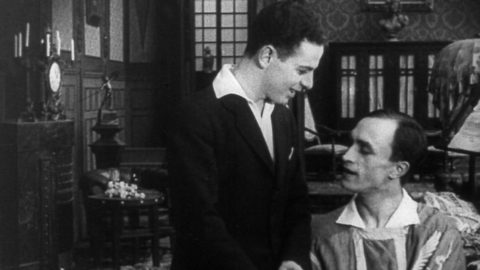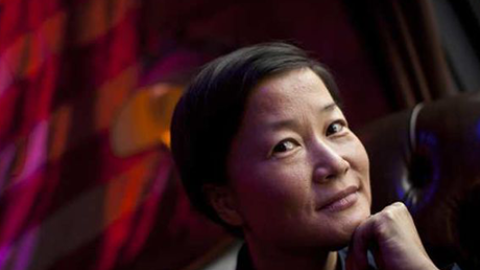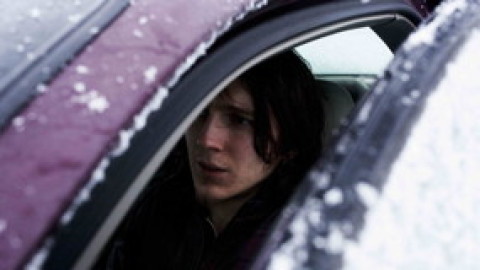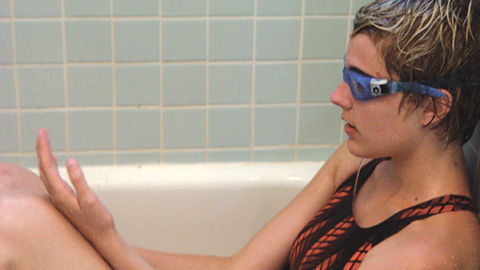Deep Focus: Lovesong

Lovesong is just that. This film about two best girlfriends and one-time lovers settles in your head like a melancholy lyric. It doesn’t break new ground in technique or subject matter. But by staying faithful to its characters—women who make, break, and alter an intimate connection—it expresses a refreshing freedom from sexual-identity dogma and narrative formula.
The director, So Yong Kim, who co-wrote the script with her husband, Bradley Rust Gray (they also collaborate on the editing), has a captivating way of defining character via atmosphere and gesture as well as action. She turns a handheld camera into an emotional tuning fork, capturing just the right flickers of feeling for each scene. She bathes her characters in natural light that emphasizes what Billy Wilder called “flesh impact.”
Riley Keough plays Sarah, who, by herself, is raising her young daughter, Jessie (played by Kim’s daughters, Jessie Ok Gray at three and Sky Ok Gray at six), while her husband, Dean (Cary Joji Fukunaga), takes prolonged, serial business trips and refuses to limit his absences. On a video call, Dean sounds so offhand and jocular we can’t tell whether he’s cheerfully selfish or afraid of losing face if he tells his employers that his wife wants an ETA. He leaves Sarah and Jessie in a gorgeous limbo—a house with picturesque views of stream, forest, and fields, in a rural Pennsylvania locale where suburbs gave way to country.
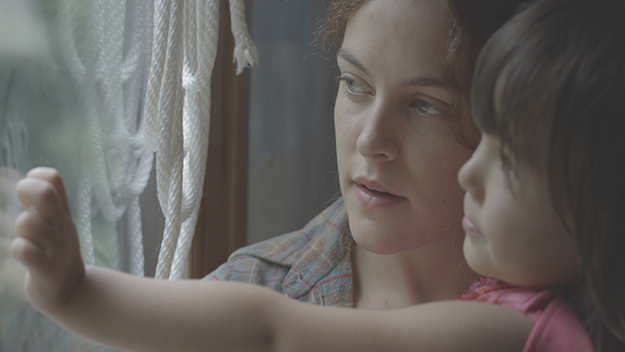
From the beginning, Kim mingles the joy and drudgery of motherhood with the release and claustrophobia of living in a remote spot surrounded by nature. We can feel the beauty and the consolation of inhabiting a green world with dewy air that settles on their skin, even when Jessie fiddles with an umbrella under the overcast sky and Sarah urges her to speed up like a fatigued if caring dog-walker. The scenes of them nuzzling and playing with nonsense words in bed exude a warmth not often achieved in big-screen mother-daughter tales. We get how exhausting this closeness can be to a woman as lonely as Sarah, and we understand why Jessie’s independence could alternately delight and irritate her. Kim’s style blends the found poetry of a handheld camera with the revelatory details of intricate mosaic editing. She cuts to a daddy long-legs on a window pane or a deer poking out of some trees so that we experience them as part of the texture of Sarah and Jessie’s lives, not as symbols or curiosities.
When Sarah’s college friend Mindy (Jena Malone), a single city-dweller with a career, arrives in town for a visit, Keough’s wonderfully malleable face conveys Sarah’s relief that Mindy recognizes who she is when she’s not a wife or mother. Malone is nimble, physically and emotionally. With a sprightly gait and laser-like glance, she conveys Mindy’s sympathy for Sarah and her avidity for life. Wearing torn jeans and midriff-baring outfits, sporting a blonde bob and black nail polish, Mindy comes across as the embodiment of play. She cooks up a call-and-response song about not liking chocolate that immediately draws Jessie, who does like chocolate, into her circle of endearment. She encourages Sarah to vent her emotions, relax, and give Jessie the room to be a terrible three. When the pair go on a car trip through the Poconos and stop at the “Malibu Rodeo” in Milford, Pa., a bull-rider takes a shine to Mindy. (He’s played by the versatile Neal Huff with an appealing confidence acres away from the wounded idealism of Phil Saviano in Spotlight.) Does Mindy enjoy the flirtation too much? Is Sarah incongruously eager to whisk away her friend and daughter?
The rodeo episode encapsulates the fleet expressiveness of Kim’s movie artistry. She photographs the bull ride in one distant, ultra-horizontal shot. Yet she manages to brew up considerable excitement, because she puts us in the bleachers with Sarah, Mindy, and Jessie as they watch their new friend being thrown. When it comes to private life, too, Kim displays remarkable powers of perspective. As Mindy’s prodding of Sarah becomes more sexually charged, we feel them each give in to desire and (maybe) a deeper affinity. The biggest question in the movie is not whether they’ll sleep together—we’re pretty sure they will—but can their relationship last?

In a low-key, post-coital dazzler, Kim focuses on Mindy’s face during a Ferris wheel ride as she stares at Sarah, who’s with Jessie on the other side of the car. As Jessie screams ecstatically, first Mindy, then Sarah, gets caught in the otherworldly drift of the amusement-park ride and perhaps their own erotic afterglow, before giving into Jessie and screaming, too. But when Mindy tries to gauge just how Sarah feels about her, all her friend/lover can say is that she’s glad Mindy came and she doesn’t regret sleeping with her. Unlike other directors, who might have used music or melodramatic heightening to brand this unintentional verbal slap as a turning point, Kim keeps it conversational and true. We understand—even when Sarah doesn’t—why Mindy would get away on the next bus back home. The visit ends abruptly, but the meatiest part of the movie has just begun.
Lovesong offers pleasures of recognition and reverie—of engaging with unformed characters as they tease out their adult identities. Our involvement intensifies in the second half, set three years later, when Sarah, now separated from Dean, flies with Jessie to Nashville for Mindy’s marriage to a Christian mensch named Leif (Ryan Eggold). In the first half it was insulting for Sarah, who had slept with only “two-and-a-half” men before Mindy, to think of her as a good-time gal capable of many casual flings. Now it looks as if Sarah knows she was mistaken. She wants to see what remains of their love and friendship while managing Jessie and getting to know Leif’s kith and kin and Mindy’s newer friends. They include the maid of honor, played by Brooklyn Decker, who delivers a surprisingly deft performance while her character pursues odd ideas like telling off-color jokes with dirty puns and ghastly punch lines at a family dinner. Sarah glimpses what a credible father would look like when Leif plays with Jessie and, with grace and wisdom, answers pointed questions about death, while Jessica (Marshall Chapman), Leif’s mother, is a tough, honest woman who believes in owning emotions like grief and regret.
For Sarah, this second act is part journey of discovery, part existential obstacle course. And that’s what it turns out to be for Mindy, too. She admits she’s at her wit’s end, but it’s not just because of the wedding itself. It’s because of all the relationships entangled with it, including her tie to her haughty, guilt-ridden mom (Rosanna Arquette, at her vivid and incisive best) and, of course, her whatever-it-is with Sarah. The movie keeps us thoroughly involved with these two oscillating characters because Kim is so remarkably attuned to her actors. She opts for more blocked-out visual compositions in Tennessee, and she crams her frames with piquant supporting characters. Her style is consistently eloquent, whether she’s picturing the morning mist over a river or two protagonists escaping time for just a little while in their own private Tennessee.
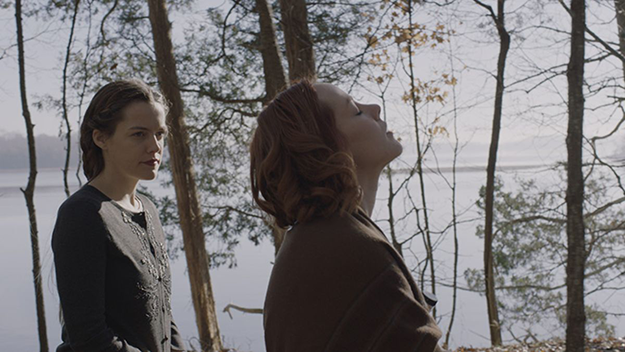
Keough was refreshingly simple even amid the baroque bravura of Mad Max: Fury Road (2015). Her runaway harem girl’s rehabilitation of the “War Boy” played by Nicholas Hoult was a highlight of that movie. Happily, in a sensitive film like Lovesong, she doesn’t overdo her soft side; she achieves an honest poignancy.
As Mindy, Malone gets a starring role that draws on everything she has—the free-spirited spontaneity she displayed in The Ballad of Jack and Rose (2005), the feistiness and wicked magnetism of her Johanna Mason in The Hunger Games (2013-15), and the off-kilter wit that allowed her to lift up, briefly, the embalmed museum scenes in Nocturnal Animals (2016).
Kim views sexuality and affection of every kind as part of a glorious and challenging continuum, then floats the vision on Keough and Malone’s affective wingspan. The result is one lovely flight.
Michael Sragow is a contributing editor to Film Comment and writes its Deep Focus column. He is a member of the National Society of Film Critics and the Los Angeles Film Critics Association. He also curates “The Moviegoer” at the Library of America website.



